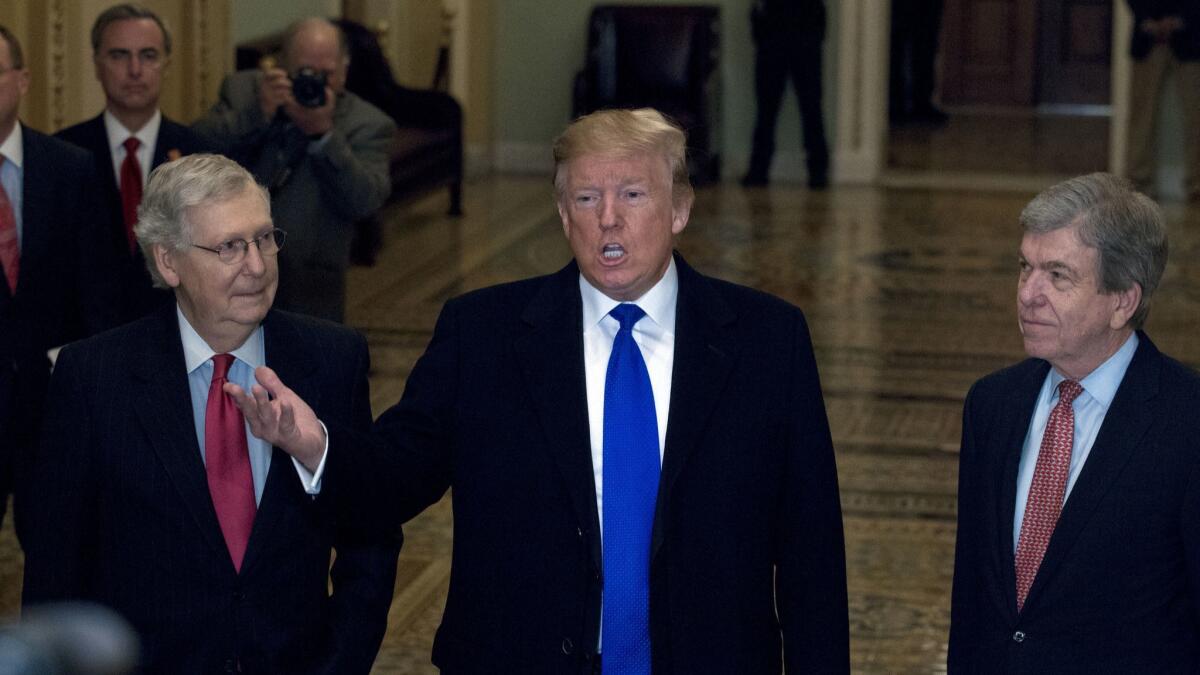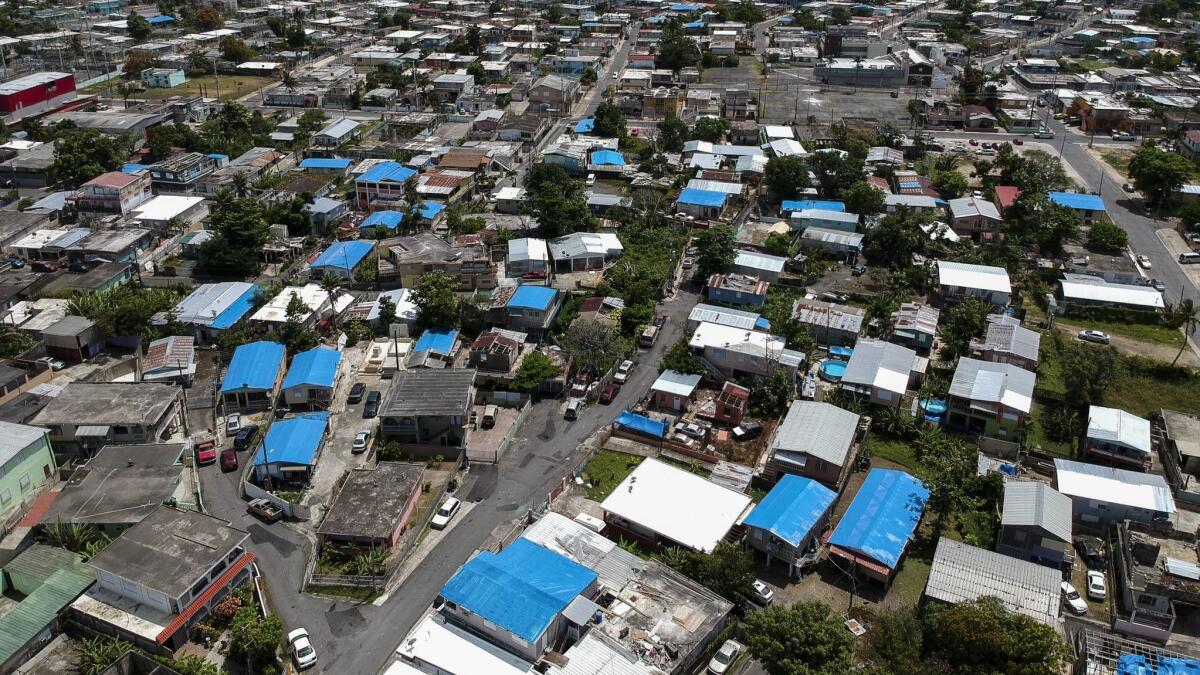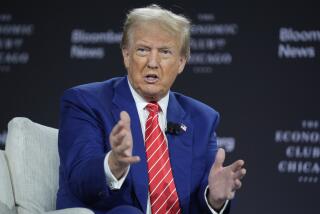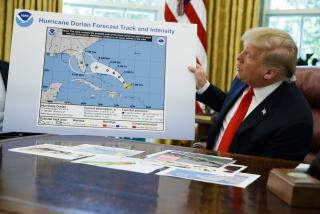Trump complains to senators that Puerto Rico gets too much hurricane relief money

Reporting from Washington — President Trump complained in a private lunch Tuesday with Senate Republicans about the amount of disaster aid designated for Puerto Rico as lawmakers prepare for a standoff over funds for the island that is still struggling to recover in the aftermath of Hurricane Maria, according to officials familiar with the meeting.
Trump’s remarks came during an hourlong, freewheeling soliloquy at the Capitol with Senate Republicans in which he boasted about the end of special counsel Robert S. Mueller III’s investigation, encouraged Republicans to take up another legislative effort on healthcare and mocked Democrats over the Green New Deal.
Trump’s decision to use the occasion to send a message about funding for Puerto Rico underscores his continuing push to limit aid to the island.
In the past, Trump has asked advisors how to reduce money for Puerto Rico and signaled that he won’t support any more aid beyond food stamp funds. At the lunch Tuesday, Trump rattled off the amount of aid that had been designated for other disaster-hit states and compared it with the amount allocated for Puerto Rico after the 2017 hurricane, an amount he said was too high, according to the officials, who spoke on the condition of anonymity to describe the private meeting.
Trump noted to GOP senators that Texas — also battered by a spate of hurricanes — was awarded $29 billion in aid, while South Carolina got $1.5 billion to recover from storms. Trump then questioned why Puerto Rico was getting $91 billion, according to two people familiar with his comments, indicating that this was too much compared with compensation for states on the mainland.
Trump remarked that one could buy Puerto Rico four times over for $91 billion, according to people familiar with his comments.
But it’s unclear where Trump got the figure for Puerto Rico aid. It is similar to estimates of the amount of damage, as opposed to what Congress has approved for relief. One congressional official said the way the money is disbursed made it difficult to quantify how much aid the island received.
Democrats have criticized the president’s reluctance to provide more money to help the island recover. On Tuesday, after recent reports about Trump’s opposition to providing additional aid, it was announced that the inspector general of the Department of Housing and Urban Development would review whether the White House has interfered with hurricane relief funding approved for Puerto Rico as part of a broader examination of the agency’s administration of disaster grants.
Congress has appropriated nearly $20 billion in HUD relief funds for Puerto Rico — which accounts for one type of federal aid that areas ravaged by natural disasters can get. Of that pot of money, $1.5 billion has been approved for spending.
A White House spokesman said Tuesday that the Trump administration is committed to “the complete recovery” of Puerto Rico. “The island has received unprecedented support and is on pace to receive tens of billions of dollars from taxpayers,” the spokesman, Judd Deere, said. “However, the Trump administration will not put taxpayers on the hook to correct a decades-old spending crisis that has left the island with deep-rooted economic problems.”
On a 90-10 vote later Tuesday afternoon, the Senate advanced disaster aid legislation drafted by Republicans that Democratic leaders have already panned as insufficient. It allocates about $13.4 billion for states that have faced recent natural disasters such as hurricanes, flooding and wildfires. It also contains $600 million in food stamp aid for Puerto Rico.
“House Democrats oppose this bill because it does not adequately address disaster relief and recovery in Puerto Rico and the territories,” said Evan Hollander, a spokesman for the Democratic-led House Appropriations Committee. “If the Senate passes this bill, we will insist on going to conference to ensure that we meet the needs of all Americans.”

The president’s Puerto Rico remarks were just one bit of what he discussed with Senate Republicans, who described Trump as being in a particularly good mood after the end of the special counsel investigation into Russian interference in the 2016 presidential election.
According to Atty. Gen. William Barr, the report provided to him by Mueller did not establish that there was a criminal conspiracy between Trump’s campaign and Moscow. Trump has touted this finding as vindication, but Democrats are calling for the full report to be released.
Trump invited himself to the Senate Republicans’ weekly policy lunch because he wanted to speak with senators after the conclusion of the Mueller investigation, according to people familiar with planning. Sen. Mike Braun (R-Ind.) described Trump’s mood as “exuberant.”
Some White House aides tried to discourage the visit, saying there was no agenda, according to two people familiar with the matter. Acting Veterans Affairs Secretary Robert Wilkie was scheduled to speak with senators about veterans care legislation at the lunch, but he was knocked off the agenda because of Trump’s impromptu visit, according to a GOP official.
During the lunch, Trump boasted to senators that Mueller’s report gave him a “clean bill of health,” according to attendees — while remarking that the investigation was “two years of …,” using an expletive, recalled a person in the room. Sen. Lindsey Graham (R-S.C.) described Trump as talking as if he had a “new lease on life,” with the president discussing how difficult the process had been on his family and close friends.
Trump also discussed a potential trade deal with China and encouraged new efforts to write healthcare legislation to replace the Affordable Care Act, senators said. Trump also mocked the Green New Deal, a proposal from some Democrats to fight climate change, and told senators, “Don’t kill it yet,” because he said he wanted to run against it next year as he campaigns for reelection, according to Sen. Kevin Cramer (R-N.D.) and another attendee.
“I think the president enjoys pointing out the uncomfortable position that some of our Democratic colleagues find [themselves] in,” Sen. John Kennedy (R-La.) said of Trump’s private comments on the Green New Deal.
Trump aired some of his regular grievances during his remarks, which took up the better part of an hour and left time for a handful of questions from Republicans near the end of the session, attendees said.
Ahead of NATO’s 70th anniversary celebrations in Washington next week, Trump continued his criticism of the alliance — venting that NATO costs too much and complaining that its glass headquarters in Brussels was too expensive, people familiar with his remarks said.
Trump refrained from reviving his attacks against the late Arizona Sen. John McCain and no Republican raised the topic of the president’s recent criticism of their colleague, who died in August.
But Trump — who scanned the room and joked to GOP senators that he likes about “90%” of those in attendance — took veiled shots at two former senators and critics: “There were two of you I didn’t like last year.”
One of them, Trump said, is now on television — a reference to former Sen. Jeff Flake (R-Ariz.), who recently signed a contract with CBS News — and the other is “getting their real estate license,” apparently referring to former Sen. Bob Corker (R-Tenn.), who amassed significant personal wealth through acquisition of commercial real estate properties before his time in elected office.
A person close to Corker responded: “I don’t think it will surprise you to learn that Sen. Corker actually is not planning to get a real estate license.”
A White House spokesman said Trump ran through a litany of topics during his visit to the GOP lunch, including his “complete and total vindication” in the special counsel’s investigation, healthcare and efforts to rebuild the nation’s military.
“He didn’t have a prepared text, OK?” said Kennedy, whom Trump singled out inside the lunch and praised for his performance on television earlier that day, according to attendees. “He talks until he is through talking, and he’s very thorough.”
“He’s always high-energy,” Cramer said. “He had a little extra today.”
Seung Min Kim, Josh Dawsey and Paul Kane write for the Washington Post.
More to Read
Sign up for Essential California
The most important California stories and recommendations in your inbox every morning.
You may occasionally receive promotional content from the Los Angeles Times.








